BBA220 Critical Review: Entrepreneurship Concepts and Ideas Analysis
VerifiedAdded on 2023/01/13
|6
|1345
|52
Essay
AI Summary
This essay provides a critical and reflective discussion on various concepts of entrepreneurship, drawing from four articles. It explores the impact of innovation and digital transformation on entrepreneurial mindsets, highlighting the importance of unconventional thinking and access to resources. The essay critiques innovation models, discusses entrepreneurship as an organizational process involving opportunity exploitation, and reflects on the historical approaches to entrepreneurship. It also addresses resource constraints faced by organizations and the concept of bricolage. Finally, the essay focuses on the role of passion in entrepreneurship, examining its motivational qualities and impact on entrepreneurial activities and identity. The essay concludes by synthesizing the key attributes discussed in the articles to provide a comprehensive understanding of entrepreneurship.

bba220
Paraphrase This Document
Need a fresh take? Get an instant paraphrase of this document with our AI Paraphraser
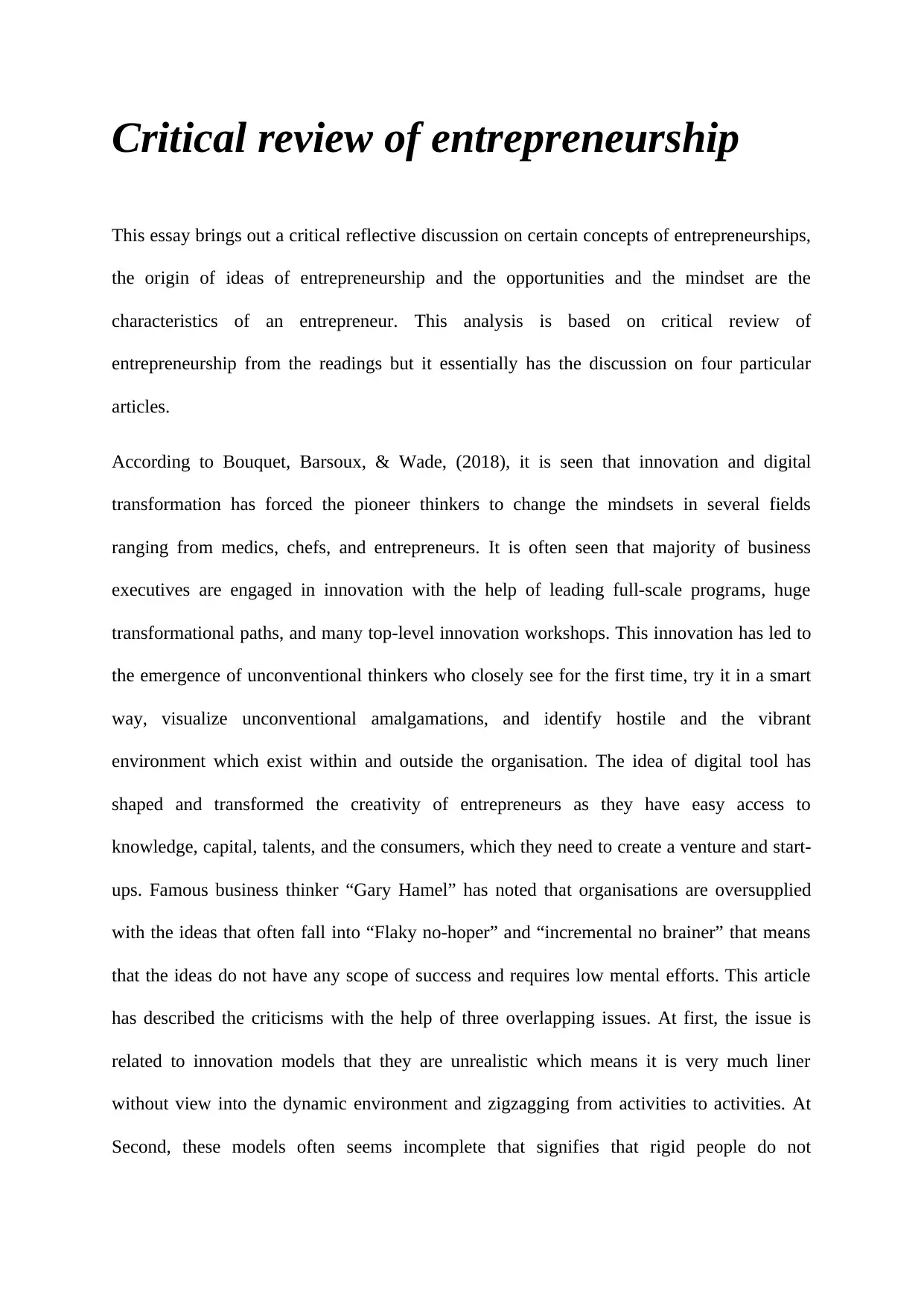
Critical review of entrepreneurship
This essay brings out a critical reflective discussion on certain concepts of entrepreneurships,
the origin of ideas of entrepreneurship and the opportunities and the mindset are the
characteristics of an entrepreneur. This analysis is based on critical review of
entrepreneurship from the readings but it essentially has the discussion on four particular
articles.
According to Bouquet, Barsoux, & Wade, (2018), it is seen that innovation and digital
transformation has forced the pioneer thinkers to change the mindsets in several fields
ranging from medics, chefs, and entrepreneurs. It is often seen that majority of business
executives are engaged in innovation with the help of leading full-scale programs, huge
transformational paths, and many top-level innovation workshops. This innovation has led to
the emergence of unconventional thinkers who closely see for the first time, try it in a smart
way, visualize unconventional amalgamations, and identify hostile and the vibrant
environment which exist within and outside the organisation. The idea of digital tool has
shaped and transformed the creativity of entrepreneurs as they have easy access to
knowledge, capital, talents, and the consumers, which they need to create a venture and start-
ups. Famous business thinker “Gary Hamel” has noted that organisations are oversupplied
with the ideas that often fall into “Flaky no-hoper” and “incremental no brainer” that means
that the ideas do not have any scope of success and requires low mental efforts. This article
has described the criticisms with the help of three overlapping issues. At first, the issue is
related to innovation models that they are unrealistic which means it is very much liner
without view into the dynamic environment and zigzagging from activities to activities. At
Second, these models often seems incomplete that signifies that rigid people do not
This essay brings out a critical reflective discussion on certain concepts of entrepreneurships,
the origin of ideas of entrepreneurship and the opportunities and the mindset are the
characteristics of an entrepreneur. This analysis is based on critical review of
entrepreneurship from the readings but it essentially has the discussion on four particular
articles.
According to Bouquet, Barsoux, & Wade, (2018), it is seen that innovation and digital
transformation has forced the pioneer thinkers to change the mindsets in several fields
ranging from medics, chefs, and entrepreneurs. It is often seen that majority of business
executives are engaged in innovation with the help of leading full-scale programs, huge
transformational paths, and many top-level innovation workshops. This innovation has led to
the emergence of unconventional thinkers who closely see for the first time, try it in a smart
way, visualize unconventional amalgamations, and identify hostile and the vibrant
environment which exist within and outside the organisation. The idea of digital tool has
shaped and transformed the creativity of entrepreneurs as they have easy access to
knowledge, capital, talents, and the consumers, which they need to create a venture and start-
ups. Famous business thinker “Gary Hamel” has noted that organisations are oversupplied
with the ideas that often fall into “Flaky no-hoper” and “incremental no brainer” that means
that the ideas do not have any scope of success and requires low mental efforts. This article
has described the criticisms with the help of three overlapping issues. At first, the issue is
related to innovation models that they are unrealistic which means it is very much liner
without view into the dynamic environment and zigzagging from activities to activities. At
Second, these models often seems incomplete that signifies that rigid people do not
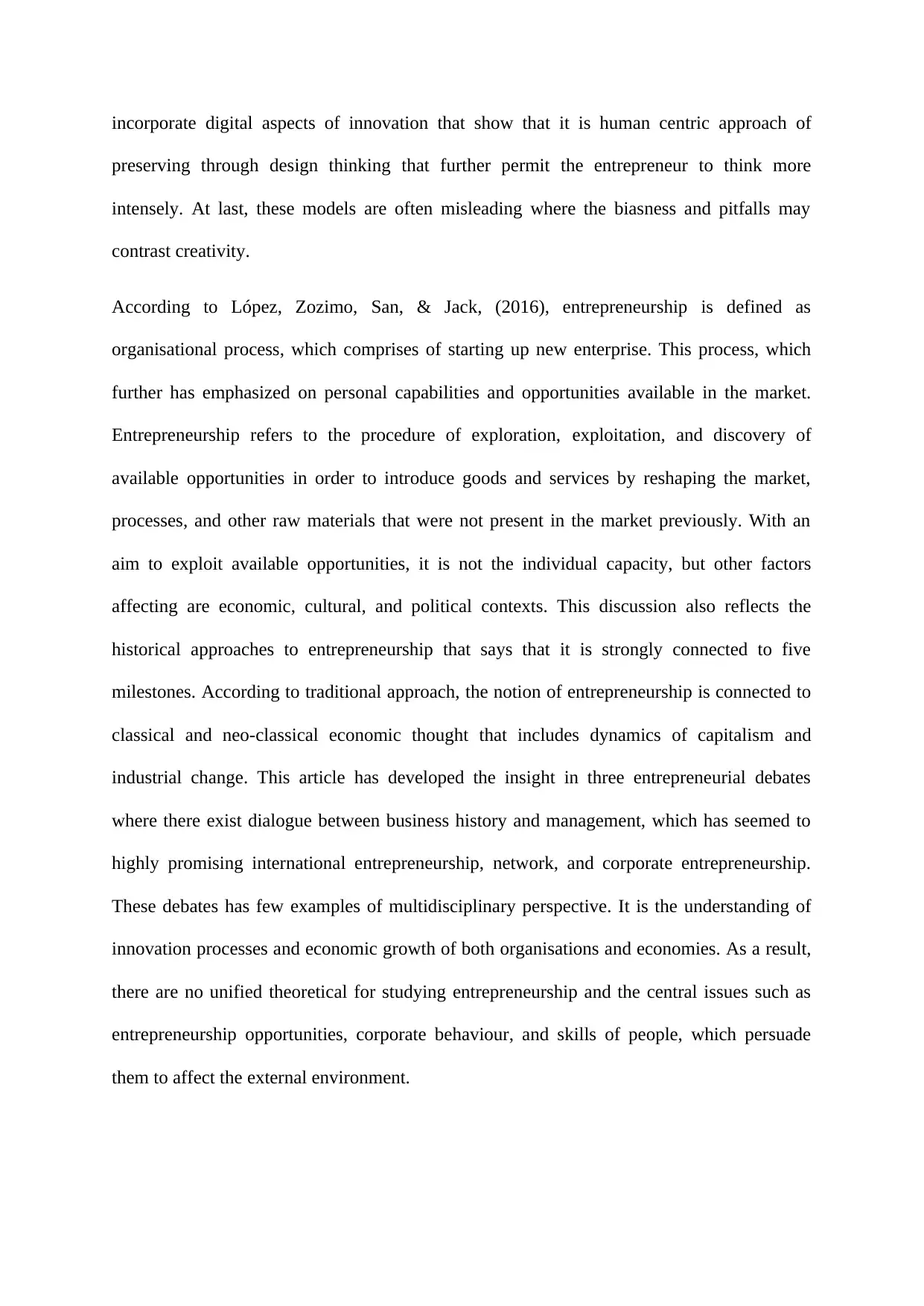
incorporate digital aspects of innovation that show that it is human centric approach of
preserving through design thinking that further permit the entrepreneur to think more
intensely. At last, these models are often misleading where the biasness and pitfalls may
contrast creativity.
According to López, Zozimo, San, & Jack, (2016), entrepreneurship is defined as
organisational process, which comprises of starting up new enterprise. This process, which
further has emphasized on personal capabilities and opportunities available in the market.
Entrepreneurship refers to the procedure of exploration, exploitation, and discovery of
available opportunities in order to introduce goods and services by reshaping the market,
processes, and other raw materials that were not present in the market previously. With an
aim to exploit available opportunities, it is not the individual capacity, but other factors
affecting are economic, cultural, and political contexts. This discussion also reflects the
historical approaches to entrepreneurship that says that it is strongly connected to five
milestones. According to traditional approach, the notion of entrepreneurship is connected to
classical and neo-classical economic thought that includes dynamics of capitalism and
industrial change. This article has developed the insight in three entrepreneurial debates
where there exist dialogue between business history and management, which has seemed to
highly promising international entrepreneurship, network, and corporate entrepreneurship.
These debates has few examples of multidisciplinary perspective. It is the understanding of
innovation processes and economic growth of both organisations and economies. As a result,
there are no unified theoretical for studying entrepreneurship and the central issues such as
entrepreneurship opportunities, corporate behaviour, and skills of people, which persuade
them to affect the external environment.
preserving through design thinking that further permit the entrepreneur to think more
intensely. At last, these models are often misleading where the biasness and pitfalls may
contrast creativity.
According to López, Zozimo, San, & Jack, (2016), entrepreneurship is defined as
organisational process, which comprises of starting up new enterprise. This process, which
further has emphasized on personal capabilities and opportunities available in the market.
Entrepreneurship refers to the procedure of exploration, exploitation, and discovery of
available opportunities in order to introduce goods and services by reshaping the market,
processes, and other raw materials that were not present in the market previously. With an
aim to exploit available opportunities, it is not the individual capacity, but other factors
affecting are economic, cultural, and political contexts. This discussion also reflects the
historical approaches to entrepreneurship that says that it is strongly connected to five
milestones. According to traditional approach, the notion of entrepreneurship is connected to
classical and neo-classical economic thought that includes dynamics of capitalism and
industrial change. This article has developed the insight in three entrepreneurial debates
where there exist dialogue between business history and management, which has seemed to
highly promising international entrepreneurship, network, and corporate entrepreneurship.
These debates has few examples of multidisciplinary perspective. It is the understanding of
innovation processes and economic growth of both organisations and economies. As a result,
there are no unified theoretical for studying entrepreneurship and the central issues such as
entrepreneurship opportunities, corporate behaviour, and skills of people, which persuade
them to affect the external environment.
⊘ This is a preview!⊘
Do you want full access?
Subscribe today to unlock all pages.

Trusted by 1+ million students worldwide
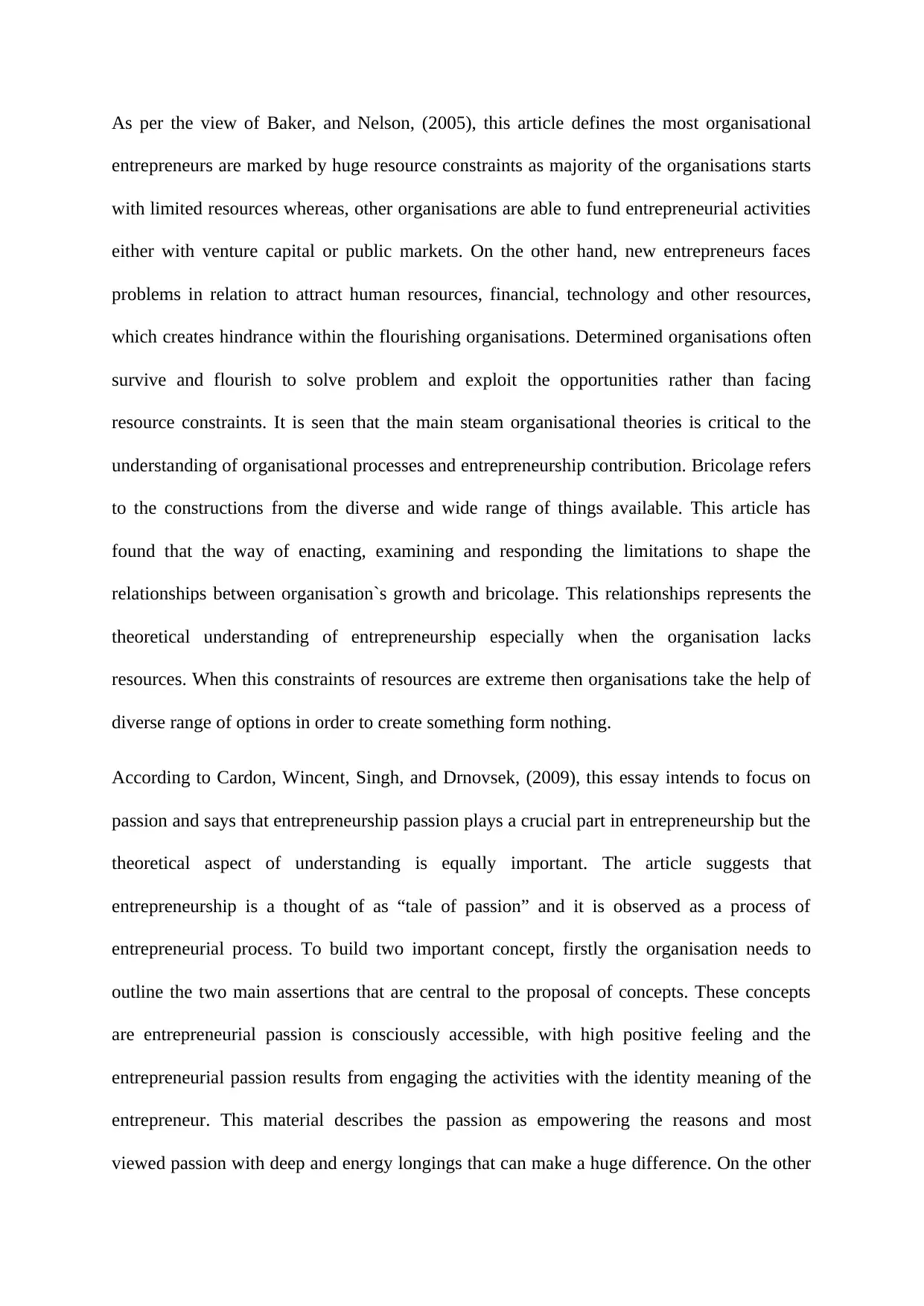
As per the view of Baker, and Nelson, (2005), this article defines the most organisational
entrepreneurs are marked by huge resource constraints as majority of the organisations starts
with limited resources whereas, other organisations are able to fund entrepreneurial activities
either with venture capital or public markets. On the other hand, new entrepreneurs faces
problems in relation to attract human resources, financial, technology and other resources,
which creates hindrance within the flourishing organisations. Determined organisations often
survive and flourish to solve problem and exploit the opportunities rather than facing
resource constraints. It is seen that the main steam organisational theories is critical to the
understanding of organisational processes and entrepreneurship contribution. Bricolage refers
to the constructions from the diverse and wide range of things available. This article has
found that the way of enacting, examining and responding the limitations to shape the
relationships between organisation`s growth and bricolage. This relationships represents the
theoretical understanding of entrepreneurship especially when the organisation lacks
resources. When this constraints of resources are extreme then organisations take the help of
diverse range of options in order to create something form nothing.
According to Cardon, Wincent, Singh, and Drnovsek, (2009), this essay intends to focus on
passion and says that entrepreneurship passion plays a crucial part in entrepreneurship but the
theoretical aspect of understanding is equally important. The article suggests that
entrepreneurship is a thought of as “tale of passion” and it is observed as a process of
entrepreneurial process. To build two important concept, firstly the organisation needs to
outline the two main assertions that are central to the proposal of concepts. These concepts
are entrepreneurial passion is consciously accessible, with high positive feeling and the
entrepreneurial passion results from engaging the activities with the identity meaning of the
entrepreneur. This material describes the passion as empowering the reasons and most
viewed passion with deep and energy longings that can make a huge difference. On the other
entrepreneurs are marked by huge resource constraints as majority of the organisations starts
with limited resources whereas, other organisations are able to fund entrepreneurial activities
either with venture capital or public markets. On the other hand, new entrepreneurs faces
problems in relation to attract human resources, financial, technology and other resources,
which creates hindrance within the flourishing organisations. Determined organisations often
survive and flourish to solve problem and exploit the opportunities rather than facing
resource constraints. It is seen that the main steam organisational theories is critical to the
understanding of organisational processes and entrepreneurship contribution. Bricolage refers
to the constructions from the diverse and wide range of things available. This article has
found that the way of enacting, examining and responding the limitations to shape the
relationships between organisation`s growth and bricolage. This relationships represents the
theoretical understanding of entrepreneurship especially when the organisation lacks
resources. When this constraints of resources are extreme then organisations take the help of
diverse range of options in order to create something form nothing.
According to Cardon, Wincent, Singh, and Drnovsek, (2009), this essay intends to focus on
passion and says that entrepreneurship passion plays a crucial part in entrepreneurship but the
theoretical aspect of understanding is equally important. The article suggests that
entrepreneurship is a thought of as “tale of passion” and it is observed as a process of
entrepreneurial process. To build two important concept, firstly the organisation needs to
outline the two main assertions that are central to the proposal of concepts. These concepts
are entrepreneurial passion is consciously accessible, with high positive feeling and the
entrepreneurial passion results from engaging the activities with the identity meaning of the
entrepreneur. This material describes the passion as empowering the reasons and most
viewed passion with deep and energy longings that can make a huge difference. On the other
Paraphrase This Document
Need a fresh take? Get an instant paraphrase of this document with our AI Paraphraser
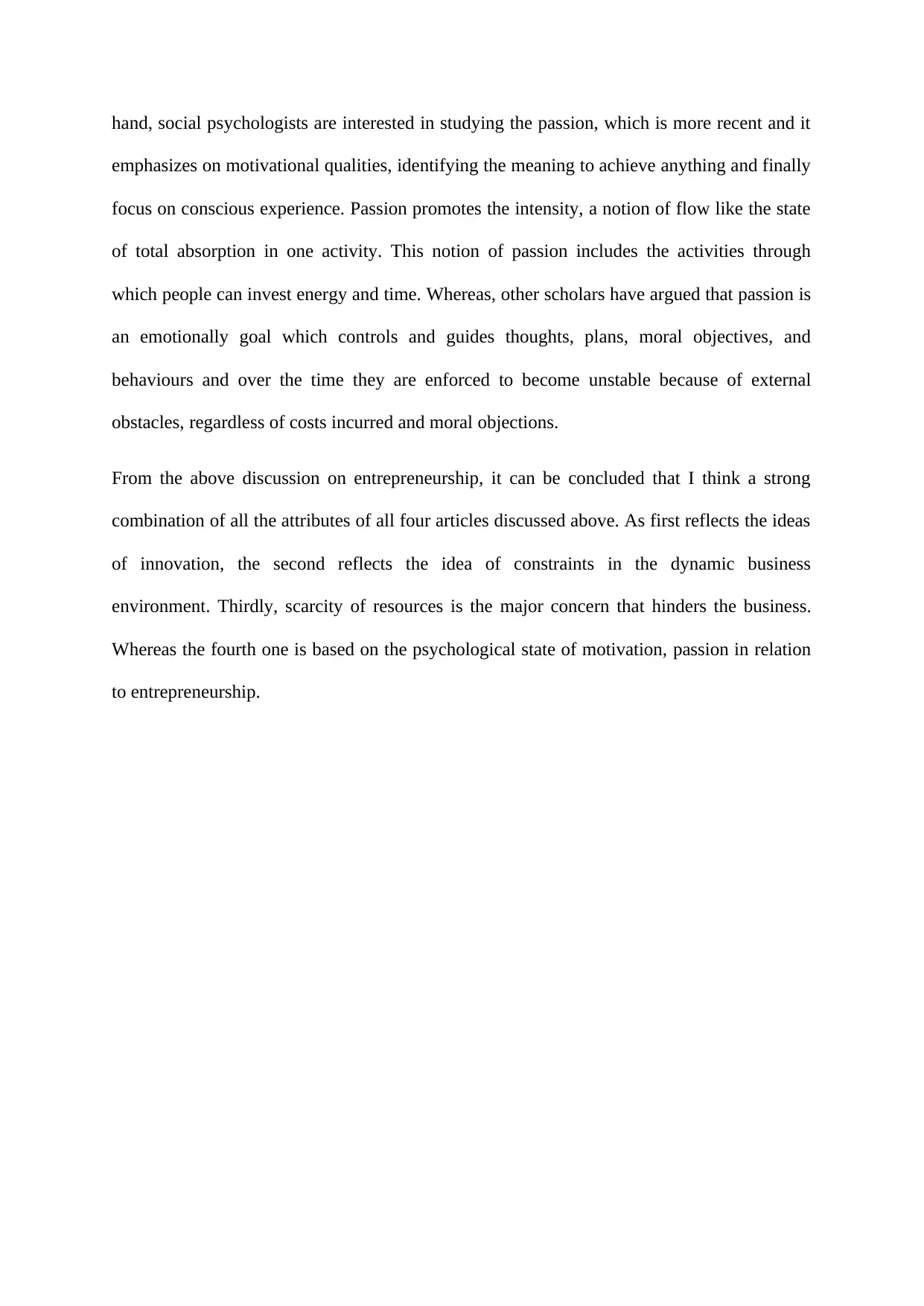
hand, social psychologists are interested in studying the passion, which is more recent and it
emphasizes on motivational qualities, identifying the meaning to achieve anything and finally
focus on conscious experience. Passion promotes the intensity, a notion of flow like the state
of total absorption in one activity. This notion of passion includes the activities through
which people can invest energy and time. Whereas, other scholars have argued that passion is
an emotionally goal which controls and guides thoughts, plans, moral objectives, and
behaviours and over the time they are enforced to become unstable because of external
obstacles, regardless of costs incurred and moral objections.
From the above discussion on entrepreneurship, it can be concluded that I think a strong
combination of all the attributes of all four articles discussed above. As first reflects the ideas
of innovation, the second reflects the idea of constraints in the dynamic business
environment. Thirdly, scarcity of resources is the major concern that hinders the business.
Whereas the fourth one is based on the psychological state of motivation, passion in relation
to entrepreneurship.
emphasizes on motivational qualities, identifying the meaning to achieve anything and finally
focus on conscious experience. Passion promotes the intensity, a notion of flow like the state
of total absorption in one activity. This notion of passion includes the activities through
which people can invest energy and time. Whereas, other scholars have argued that passion is
an emotionally goal which controls and guides thoughts, plans, moral objectives, and
behaviours and over the time they are enforced to become unstable because of external
obstacles, regardless of costs incurred and moral objections.
From the above discussion on entrepreneurship, it can be concluded that I think a strong
combination of all the attributes of all four articles discussed above. As first reflects the ideas
of innovation, the second reflects the idea of constraints in the dynamic business
environment. Thirdly, scarcity of resources is the major concern that hinders the business.
Whereas the fourth one is based on the psychological state of motivation, passion in relation
to entrepreneurship.
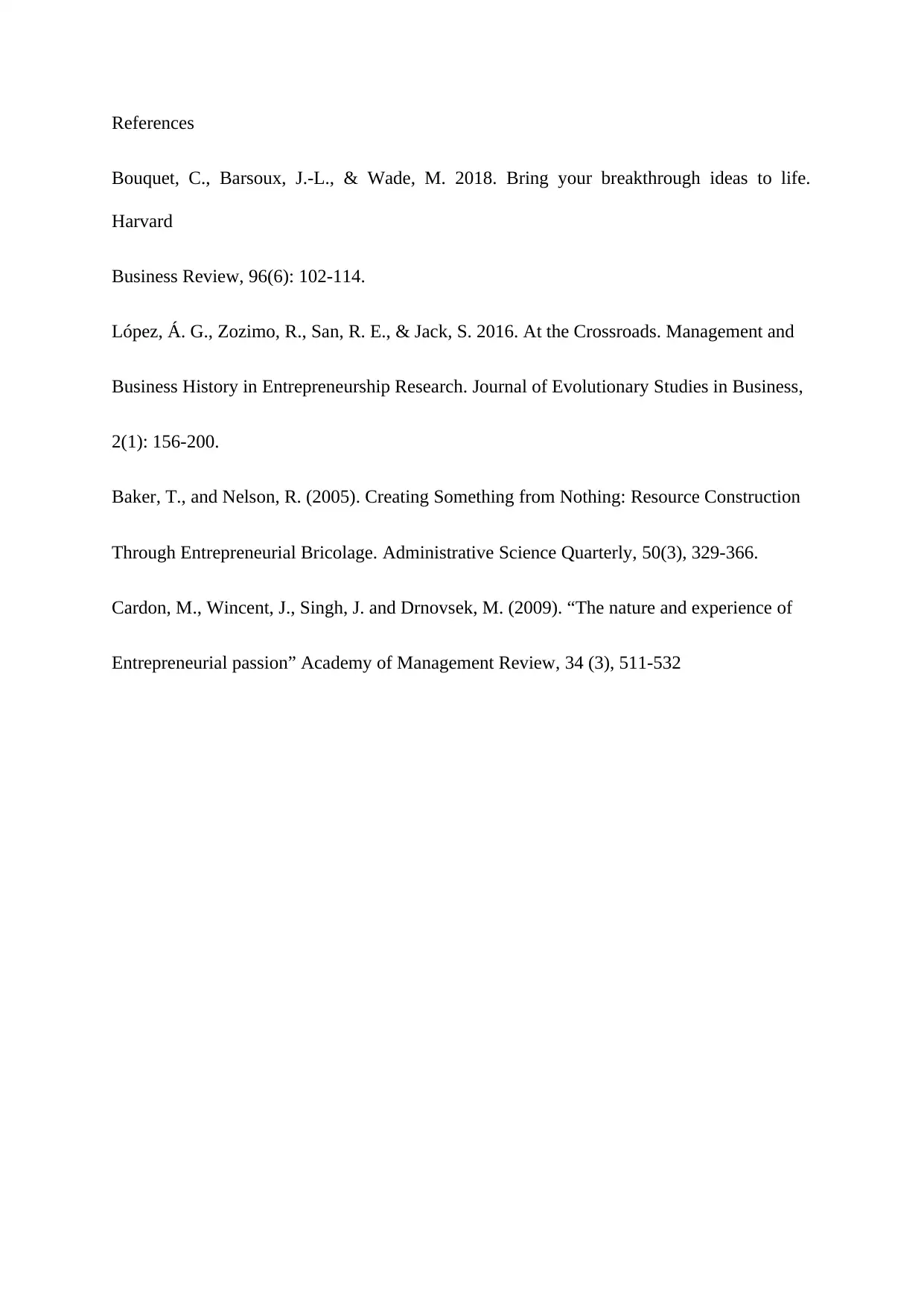
References
Bouquet, C., Barsoux, J.-L., & Wade, M. 2018. Bring your breakthrough ideas to life.
Harvard
Business Review, 96(6): 102-114.
López, Á. G., Zozimo, R., San, R. E., & Jack, S. 2016. At the Crossroads. Management and
Business History in Entrepreneurship Research. Journal of Evolutionary Studies in Business,
2(1): 156-200.
Baker, T., and Nelson, R. (2005). Creating Something from Nothing: Resource Construction
Through Entrepreneurial Bricolage. Administrative Science Quarterly, 50(3), 329-366.
Cardon, M., Wincent, J., Singh, J. and Drnovsek, M. (2009). “The nature and experience of
Entrepreneurial passion” Academy of Management Review, 34 (3), 511-532
Bouquet, C., Barsoux, J.-L., & Wade, M. 2018. Bring your breakthrough ideas to life.
Harvard
Business Review, 96(6): 102-114.
López, Á. G., Zozimo, R., San, R. E., & Jack, S. 2016. At the Crossroads. Management and
Business History in Entrepreneurship Research. Journal of Evolutionary Studies in Business,
2(1): 156-200.
Baker, T., and Nelson, R. (2005). Creating Something from Nothing: Resource Construction
Through Entrepreneurial Bricolage. Administrative Science Quarterly, 50(3), 329-366.
Cardon, M., Wincent, J., Singh, J. and Drnovsek, M. (2009). “The nature and experience of
Entrepreneurial passion” Academy of Management Review, 34 (3), 511-532
⊘ This is a preview!⊘
Do you want full access?
Subscribe today to unlock all pages.

Trusted by 1+ million students worldwide
1 out of 6
Related Documents
Your All-in-One AI-Powered Toolkit for Academic Success.
+13062052269
info@desklib.com
Available 24*7 on WhatsApp / Email
![[object Object]](/_next/static/media/star-bottom.7253800d.svg)
Unlock your academic potential
Copyright © 2020–2026 A2Z Services. All Rights Reserved. Developed and managed by ZUCOL.




